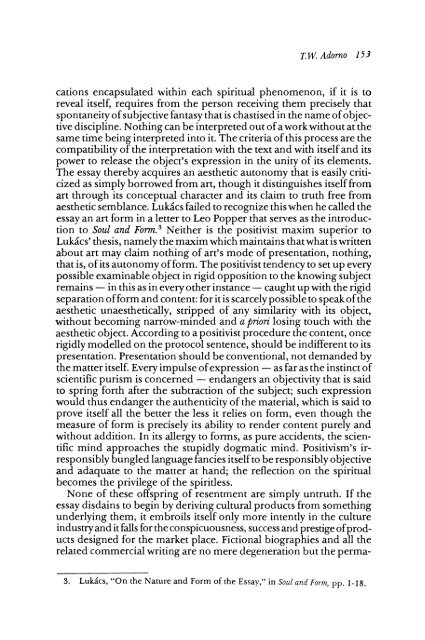Adorno-The-Essay-As-Form
Adorno-The-Essay-As-Form
Adorno-The-Essay-As-Form
You also want an ePaper? Increase the reach of your titles
YUMPU automatically turns print PDFs into web optimized ePapers that Google loves.
cations encapsulated within each spiritual phenomenon, if it is toreveal itself, requires from the person receiving them precisely thatspontaneity of subjective fantasy that is chastised in the name of objectivediscipline. Nothing can be interpreted out of aworkwithout at thesame time being interpreted into it. <strong>The</strong> criteria of this process are thecompatibility of the interpretation with the text and with itself and itspower to release the object's expression in the unity of its elements.<strong>The</strong> essay thereby acquires an aesthetic autonomy that is easily criticizedas simply borrowed from art, though it distinguishes itself fromart through its conceptual character and its claim to truth free fromaesthetic semblance. Lukscs failed to recognize this when he called theessay an art form in a letter to Leo Popper that serves as the introductionto Soul and <strong>Form</strong>.3 Neither is the positivist maxim superior toLukscs' thesis, namely the maxim which maintains that what is writtenabout art may claim nothing of art's mode of presentation, nothing,that is, of its autonomy of form. <strong>The</strong> positivist tendency to set up everypossible examinable object in rigid opposition to the knowing subjectremains - in this as in every other instance -caught up with the rigidseparation ofform and content: for it is scarcely possible to speakoftheaesthetic unaesthetically, stripped of any similarity with its object,without becoming narrow-minded and a priori losing touch with theaesthetic object. According to a positivist procedure the content, oncerigidly modelled on the protocol sentence, should be indifferent to itspresentation. Presentation should be conventional, not demanded bythe matter itself. Every impulse of expression -as far as the instinct ofscientific purism is concerned - endangers an objectivity that is saidto spring forth after the subtraction of the subject; such expressionwould thus endanger the authenticity of the material, which is said toprove itself all the better the less it relies on form, even though themeasure of form is precisely its ability to render content purely andwithout addition. In its allergy to forms, as pure accidents, the scientificmind approaches the stupidly dogmatic mind. Positivism's irresponsiblybungled language fancies itself to be responsibly objectiveand adaquate to the matter at hand; the reflection on the spiritualbecomes the privilege of the spiritless.None of these offspring of resentment are simply untruth. If theessay disdains to begin by deriving cultural products from somethingunderlying them, it embroils itself only more intently in the cultureindustry and it falls for the conspicuousness, success and prestige ofproductsdesigned for the market place. Fictional biographies and all therelated commercial writing are no mere degeneration but the perma-3. LukPcs, "On the Nature and <strong>Form</strong> of the <strong>Essay</strong>," in Soul and <strong>Form</strong>, pp. 1- 18.


